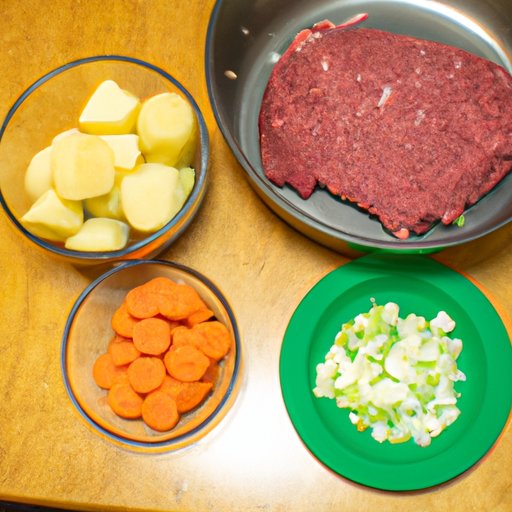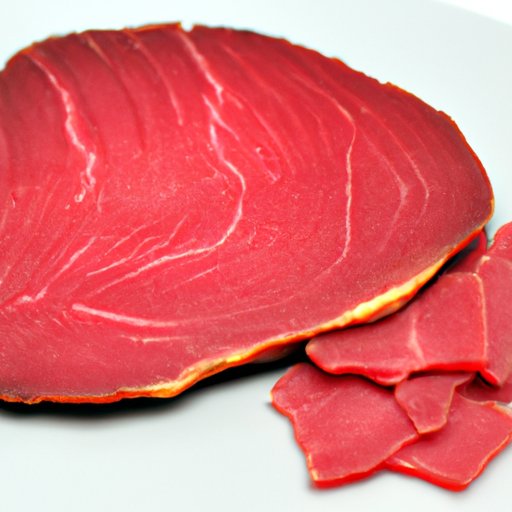Introduction
Corned beef is a type of salted and cured beef that has been a staple in many cultures for centuries. It’s made by marinating beef brisket in a brine solution of salt, sugar, and spices. The name “corned beef” comes from the large pieces of coarse salt (or “corns”) used to cure the beef. Corned beef is widely available in supermarkets, delis, and other food stores, and it’s a popular ingredient in dishes like Reuben sandwiches and hash.
But is corned beef healthy? This article will explore the nutritional content of corned beef and discuss the potential health benefits of eating this meat. We’ll also compare the health benefits of corned beef to other meats, and provide some tips and recipes for making a delicious and healthy corned beef meal.
Nutritional Analysis of Corned Beef: Is it Healthy?
Corned beef is a good source of protein, with a 3-ounce serving providing up to 17.7 grams of protein. It’s also high in fat, with 14.5 grams per serving. In addition to protein and fat, corned beef contains some vitamins and minerals, including iron, zinc, vitamin B12, and selenium.
A study published in the journal Nutrients found that corned beef is an excellent source of essential amino acids, which are necessary for the body to build and repair muscle. The study also found that corned beef is a good source of conjugated linoleic acid, a type of fatty acid that may help reduce inflammation and improve insulin sensitivity.

Exploring the Pros and Cons of Eating Corned Beef
Eating corned beef can have both pros and cons. On one hand, it’s a good source of protein and contains some essential vitamins and minerals. On the other hand, it’s high in sodium and saturated fat, both of which can be detrimental to health if consumed in excess.
Pros of Eating Corned Beef
Corned beef is a good source of protein, with a 3-ounce serving providing up to 17.7 grams. Protein is essential for building and repairing muscle, as well as maintaining a healthy immune system. Corned beef is also high in iron, zinc, vitamin B12, and selenium, all of which are important for keeping the body healthy.
Cons of Eating Corned Beef
Corned beef is high in sodium, with a 3-ounce serving containing 663 milligrams. Eating too much sodium can lead to water retention, high blood pressure, and an increased risk of stroke and heart attack. Corned beef is also high in saturated fat, with 9.4 grams per serving. Eating too much saturated fat can increase cholesterol levels and increase the risk of heart disease.
What are the Health Benefits of Eating Corned Beef?
Despite the drawbacks of its high sodium and saturated fat content, there are some potential health benefits associated with eating corned beef. Let’s take a look at some of them.
Heart Health Benefits
Corned beef is a good source of conjugated linoleic acid (CLA), a type of fatty acid that may help reduce inflammation and improve insulin sensitivity. A study published in the journal International Journal of Molecular Sciences found that CLA could have a beneficial effect on cardiovascular health. The study found that CLA could reduce cholesterol levels and triglycerides, as well as reduce the risk of atherosclerosis.
Impact on Blood Pressure
Corned beef is high in potassium, with a 3-ounce serving providing 439 milligrams. Potassium helps regulate blood pressure and is essential for maintaining healthy blood vessels and nerves. A study published in the journal Hypertension found that a diet high in potassium can reduce the risk of stroke and coronary heart disease.
Weight Management
Corned beef is high in protein, which can help you feel fuller for longer and reduce cravings. A study published in the journal Appetite found that diets high in protein can help people lose weight and maintain a healthy weight. Additionally, corned beef is low in carbohydrates, which can help manage blood sugar levels.
Other Health Benefits
Corned beef is also a good source of selenium, a mineral that plays an important role in thyroid function and immunity. A study published in the journal Nutrients found that selenium could reduce inflammation and oxidative stress, as well as protect against certain types of cancer.

How to Make a Healthy Corned Beef Meal
Making a healthy corned beef meal is easy. Here are some tips and recipes to get you started.
Tips for Preparing Corned Beef
- Choose lean cuts of corned beef, such as the flat cut or point cut.
- Trim visible fat from the meat before cooking.
- Reduce the amount of salt added to the cooking liquid.
- Add vegetables to your dish to increase the nutrient content.
- Use low-fat dairy products, such as Greek yogurt, in place of cream.
Recipes for Delicious and Healthy Corned Beef Dishes
- Corned Beef Hash with Sweet Potatoes and Kale: www.tasteofhome.com/recipes/corned-beef-hash-with-sweet-potatoes-kale/
- Corned Beef and Cabbage Soup: www.allrecipes.com/recipe/222456/corned-beef-and-cabbage-soup/
- Corned Beef and Potato Salad: www.thespruceeats.com/corned-beef-and-potato-salad-recipe-3060359
- Corned Beef Reuben Sandwich: www.thespruceeats.com/classic-reuben-sandwich-recipe-480090
Comparing the Health Benefits of Corned Beef to Other Meats
Corned beef is often compared to other meats in terms of nutrition and health benefits. Let’s take a look at how corned beef compares to pork, beef, and chicken.
Comparison of Nutrient Content
Corned beef is higher in fat and sodium than pork, beef, and chicken. It’s also lower in calories and carbohydrates. All four meats are good sources of protein, with pork and beef being the highest.
Comparison of Health Benefits
All four meats contain some essential vitamins and minerals, but corned beef is the highest in selenium, vitamin B12, and zinc. Pork and beef are higher in iron, while chicken is the highest in calcium. Additionally, corned beef is higher in conjugated linoleic acid than any of the other meats.
Conclusion
Corned beef is a tasty source of protein that can be enjoyed in a variety of dishes. It’s high in protein, essential vitamins and minerals, and conjugated linoleic acid. Eating corned beef can also provide some health benefits, including improved heart health, better blood pressure, and weight management. However, it’s important to remember that corned beef is high in sodium and saturated fat, and should be eaten in moderation.
By following the tips and recipes outlined in this article, you can enjoy a delicious and healthy corned beef meal. So the next time you’re in the mood for something savory and satisfying, give corned beef a try.
In conclusion, corned beef can be a healthy part of a balanced diet. It’s a good source of protein and essential vitamins and minerals, and it contains conjugated linoleic acid, which may help reduce inflammation and improve insulin sensitivity. Just remember to eat it in moderation, as it’s high in sodium and saturated fat.
(Note: Is this article not meeting your expectations? Do you have knowledge or insights to share? Unlock new opportunities and expand your reach by joining our authors team. Click Registration to join us and share your expertise with our readers.)
